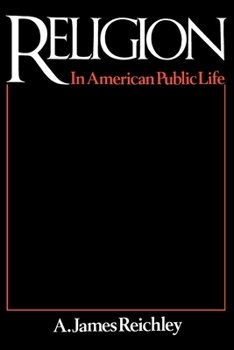Religion in American Public Life
Select Format
Select Condition 
Book Overview
"We are," said Supreme Court Justice William O. Douglas, "a religious people," and his observation is continually borne out in every aspect of American public life. Religious ideals underlay the founding of the colonies and the firming of the new nation; the activities of churches have been closely interwined with politics in the abolition of slavery, the drive for women's suffrage, the prohibition of liquor, and the civil rights movement of the 1960s. The recent revival of arguments over the participation of relgious groups in politics points up the continuing controversey about the separation of church and state. In this study, A. James Reichley places religion and politics within a conceptual framework that considers the values in which both are rooted and examines, in light of that framework, the actual impact of religion and religious groups on American public life. He analyzes the underlying causes and issues involved, their contemporary impact, and their continuing evolution. Finally he discusses how the involvement of religious groups in politics can be carried on within the context of the separation of church and state without threat to civil liberties or seculat politicalization of religion.
Format:Paperback
Language:English
ISBN:0815773773
ISBN13:9780815773771
Release Date:October 1985
Publisher:Brookings Institution Press
Length:420 Pages
Weight:1.85 lbs.
Dimensions:1.2" x 6.2" x 9.1"
Customer Reviews
2 ratings
RELIGION HAS A PLACE
Published by Thriftbooks.com User , 15 years ago
Anyone interested in the fascinating and contentious issues in American religious history is advised to read this work. It is hard for me to believe anyone would be truly dissapointed here. Its strength is its breadth and conclusions. At 360 pages, this is about as comprehensive as any general history is likely to be. Reichley starts with a discussion of the constitution and beliefs of the founders, and goes on to relate our religious history to 1985. Segments include the Jews, Mormons and evangelicals as well as mainline Protestants and Catholics. All of the major court cases and public debates are explained. It is worth a read for this material alone. But the author also makes us think about these issues. He makes it clears that many of today's assumptions-particularly about church state seperation, were not even considered earlier. The Founding Fathers, even Jefferson, never intended that religion be driven from the public square. Reichley states that those who see religion as merely a private choice in the manner of sports or entertainment fail to appreciate its crucial role in our democracy. Ultimately, a society without religion is a society without morality.
Excellent Analysis. Balanced, Fair and Enlightening.
Published by Thriftbooks.com User , 23 years ago
This book is essential reading for an informed perspective on the role of religion in American Public Life. Reichley does justice to the complex relationship between religion politics and human values. His typology of value systems provides a very useful framework for understanding the differing perspectives on the issue and avoiding simplistic characterizations of those who hold differing points of view. There is a very good examination of the intentions of the Founders of the USA and the proper interpretation of the First Amendment to its Constitution. The historical analysis covers the period of the founding of the USA up to the mid 1980's. It is balanced and fair and presents a good case for the vital and necessary role that religion must play in American public life within the context of the separation of church and state.I see that the author has written more recent books that expand upon and update the material this book but, even as it is, this book contains much relevant and important material. Highly recommended.





